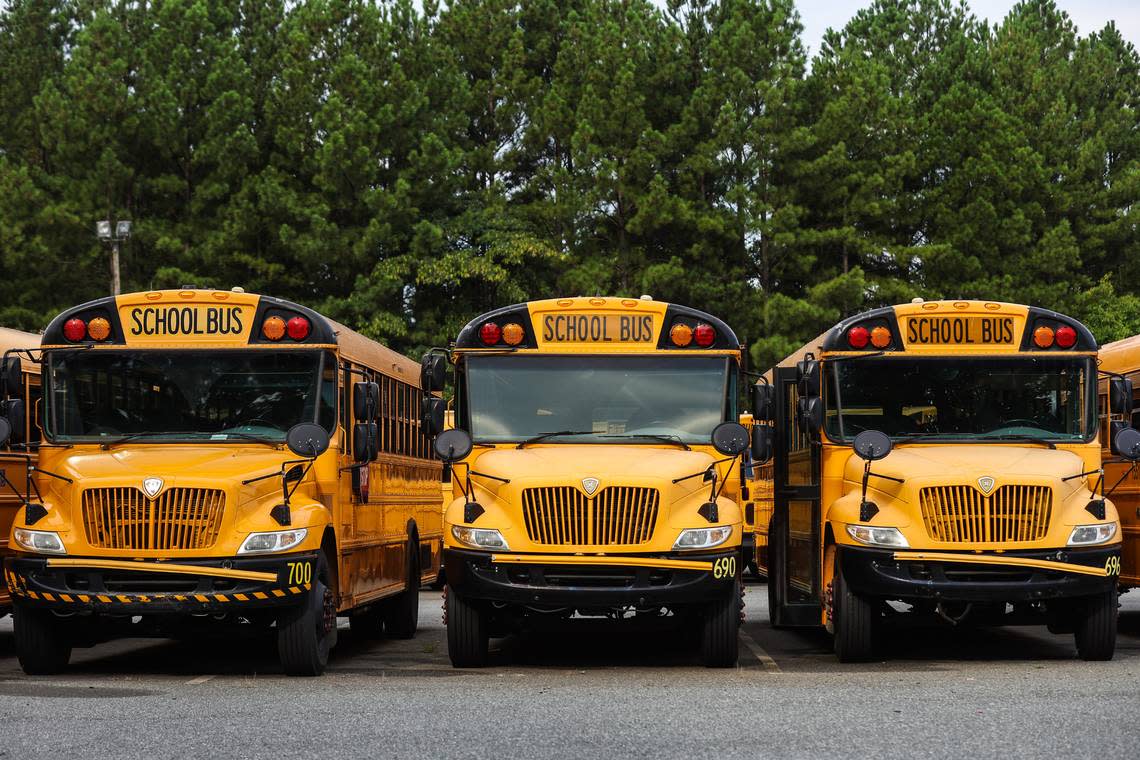‘Zero’ chance of NC budget before Sept. 1, Speaker says. What that means for raises
North Carolina’s state budget stagnation will continue until September.
House Speaker Tim Moore, a Kings Mountain Republican, said Monday there is “zero” chance that a budget will pass before Sept. 1. He planned to meet again this week with Senate leader Phil Berger, an Eden Republican.
Republicans have total control of the General Assembly. With supermajorities in both chambers, Democratic Gov. Roy Cooper’s veto can easily be overturned. While past budget delays have come down to disagreements between the two parties, this year’s issues are only between House and Senate Republicans.
The budget delay means raises for teachers and state employees have not gone into effect. Moore described the impending raises — even though they’ll be months late — as “significant and “meaningful.”
“They are designed to reward teachers and state employees,” Moore said. “They are designed to try to do more than just keep up with the inflation that we are dealing with. And to do so in a way that makes sense.”
There is a nearly 25% vacancy rate among state employees across the state, and agency leaders, both Republicans and Democrats, have called for significant raises for employees.
“There’s also the across the board pay raises. But, no surprise, there’s additional sums that are going to be allocated for some of these hard to fill positions,” Moore said. “There are some positions that — like for example, in the community colleges, we know it’s difficult to get nursing teachers, nursing professors in community colleges — there are examples of those around the state where there’s additional funds allowed to be able to fund that.”
The House and Senate each passed a version of the state budget bill earlier this year, but they were not able to come to an agreement on a final budget before the new fiscal year started July 1. Negotiations have dragged out all summer while tens of thousands of teachers and state employees wait on raises. Traditional-calendar public schools start a new year later this month.
Among the items still being negotiated are legalizing more casinos and spending for savings and capital improvements.
Berger told reporters recently that another undecided item is whether or not to fund the long-stalled African American monument on the historic State Capitol grounds, which was in the Senate’s proposal. Moore said Monday that he didn’t know the status of the monument in the final budget, adding that North Carolina Freedom Park, which is a different project, will soon open.
Freedom Park celebrates the Black experience in the state and is nearing completion a few blocks from the Capitol, between the Legislative Building and the Executive Mansion. The park is slated to open Aug. 23.
How much raises could be
The Senate’s budget bill this past spring proposed 5% raises over two years for most state employees, with 4.5% over two years for teachers, though that percentage would vary by teacher. The House proposed 10.2% average raises for teachers, with 7.5% for state employees and higher for some employees in harder-to-fill positions. The final budget will likely include raises that lie somewhere between those amounts.
Raises will all be retroactive to July 1, Moore said. Retirees will also get an increase, though he would not say if that would be recurring or one-time money. In the past, budgets have given retirees cost-of-living adjustment bonuses, but not raises.

Moore told reporters after a no-vote House session Monday that he and Berger are making progress, and a list of more than 100 items to discuss last week has been reduced to about 70. They’ve already agreed on tax cuts and employee raises, Moore said, though they won’t announce the amount until the budget is complete.
Both Moore and Berger are open to passing smaller, “mini” budget bills with raises if a full budget isn’t reached. Moore said they’re still working toward a full budget soon, with more meetings on Monday and Tuesday.
That could also mean a delay of Medicaid expansion, which is tied to passage of a biennial budget. The North Carolina Department of Health and Human Services said it’s imperative the legislature pass its budget by Sept. 1 in order to enact Medicaid expansion by Oct. 1. Republican leaders do not want to separate Medicaid expansion from the budget.
Sen. Ralph Hise, a Spruce Pine Republican and a head budget writer, said that if a budget isn’t passed by Sept. 1, expansion would be delayed by a quarter.
“I hope we can meet the deadline,” Hise said. “If we can’t, the concept is that Medicaid expansion begins when we have a budget — that was the deal in passing the Medicaid expansion bill.”
The governor has urged lawmakers to decouple expansion from the budget and criticized Republicans’ failure to reach a budget deal yet.
“It looks like their vacations are more important than keeping rural hospitals open and making sure students have teachers and bus drivers,” Cooper spokesperson Jordan Monaghan told The N&O on Monday when asked about the continuing delay.
Hise said another factor in the timing of a state budget’s passage is the funding of federal block grants, which are not included in North Carolina’s continuing resolution that allows the state to keep operating at the previous year’s spending levels rather than shut down like the federal government would. The federal fiscal year begins Oct. 1.
